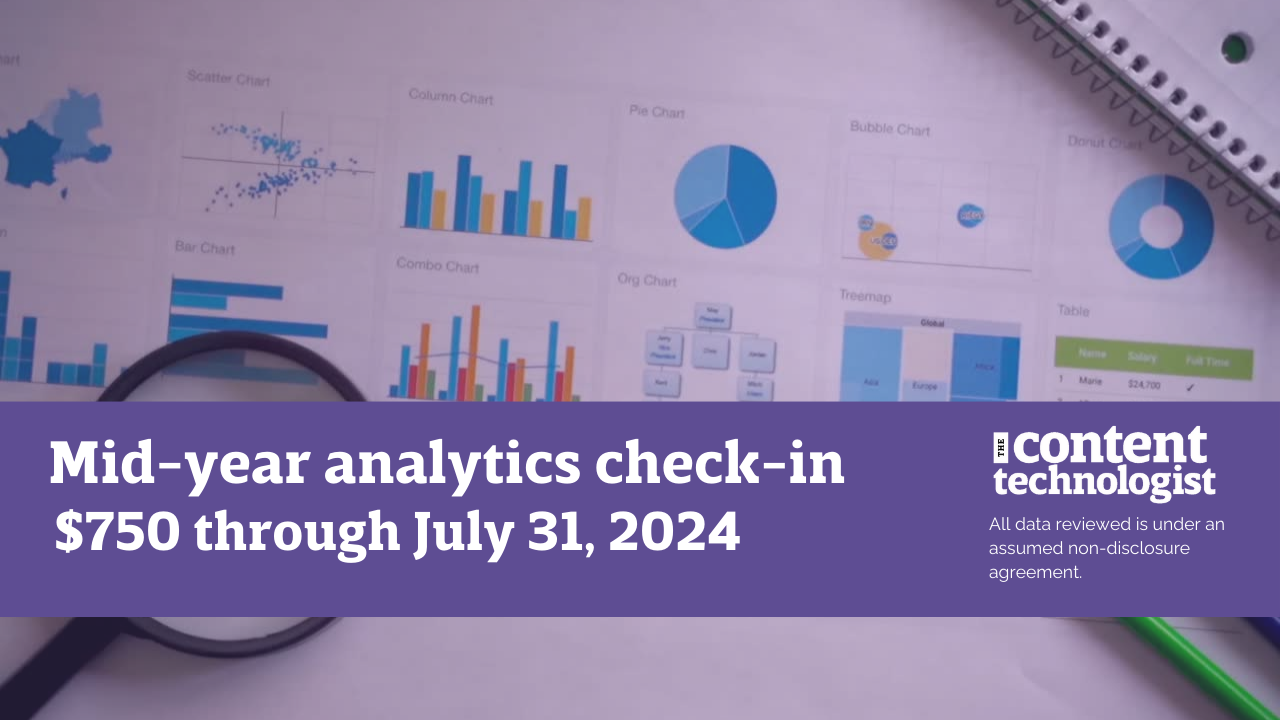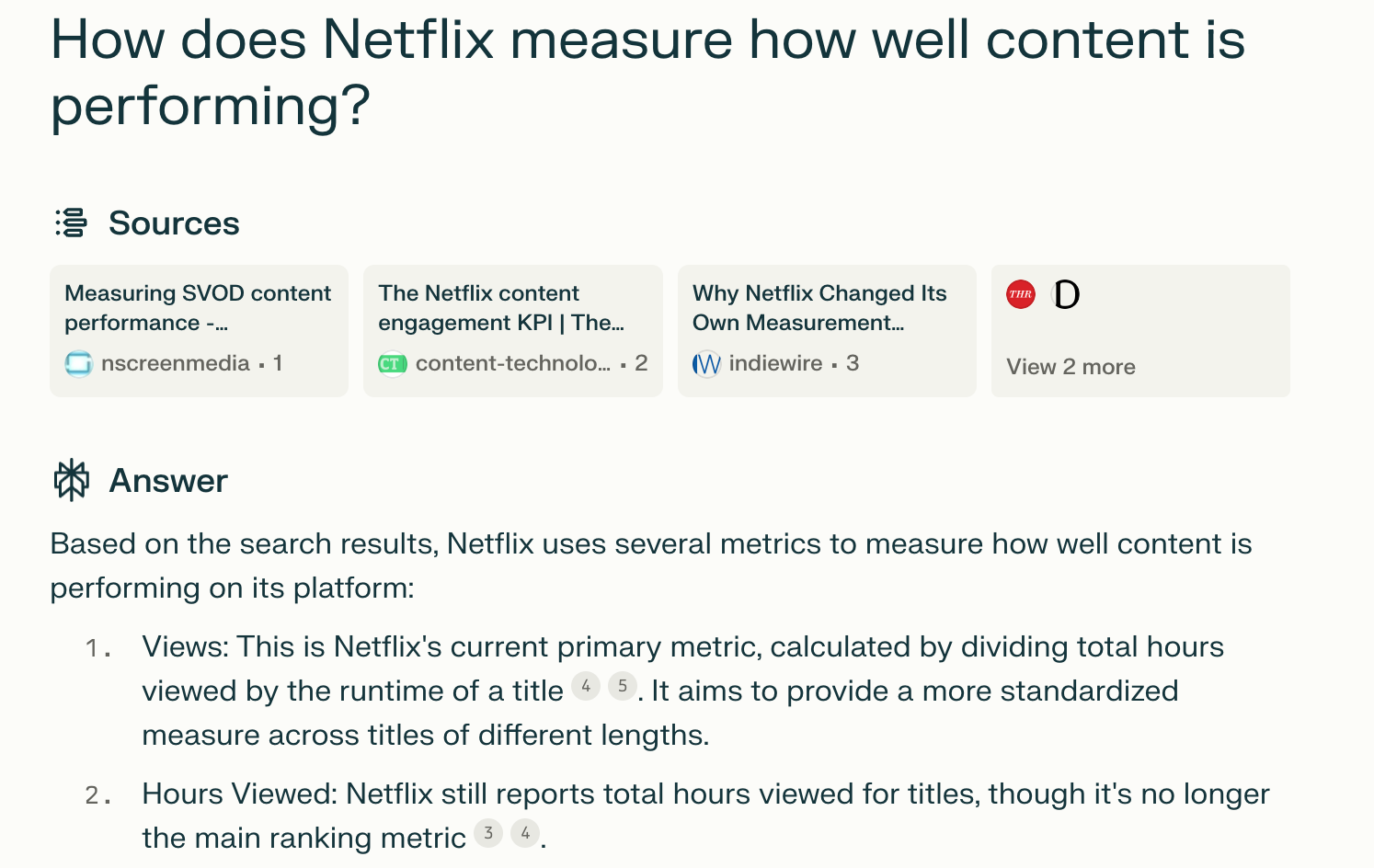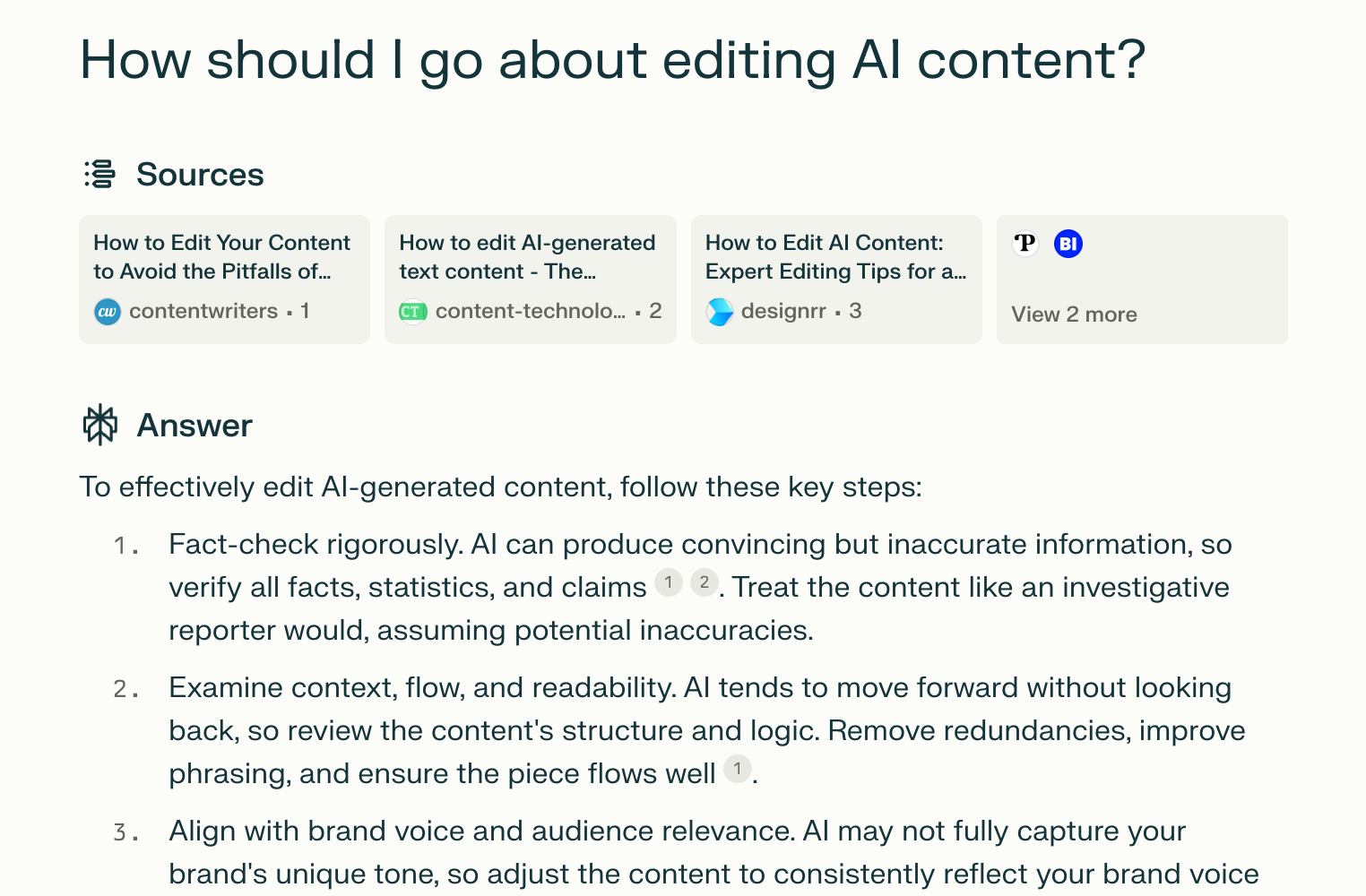In today's issue, we're doing a bottle episode and diving into the AI tool Perplexity: As a publisher and consultant, should I care about it?
But first!

How is your content performing so far this year?
Reserve your July analytics collabAssessing Perplexity: What's an indie B2B publisher to do?
Should I, as a website publisher, be angry that an AI summary engine includes my content in its index?
The other day I was taking my own medicine and checking out where the high-quality visitors are coming from, and lo and behold, I spotted some new activity in my referrals:

Well, well. I've been visited by Perplexity and Google Lens. I had only seen screenshots of Perplexity and know Google Lens exists on my spouse's phone.
The order of metrics in the GA4 screenshot above is New users / Engaged sessions / Engagement rate / Sessions per user / Average engagement time (per user).
This data tells me (so you don't have to read it) is that Google Lens may have sent me new users, but none of those sessions were any good, so no need to worry about that.
But Perplexity... those users could become valuable. Two users, both engaged, with lower-than-average but still decent time on site... Gonna watch this to see if it converts down the line.
In which the tech press is angry about Perplexity
Because, see, I also read this article in Wired this week, and Condé Nast is very angry that Perplexity is crawling their content and regurgitating it in their Wikipedia-like article summaries.
Digging in more deeply, Forbes (a total exploitative pay-for-play content corporate greed vampire-company if I ever saw one) is also quite angry with Perplexity because, well... they're right, no one will visit Forbes' thinly veiled boring-ass PR content if audiences can find the single decent insight in each article for free. Considering the amount of criminals Forbes has propelled to the top of search results, as a spectator, I see the fight over Perplexity as a battle of the metaphorical Large Adult Sons.
On one side, the publishers want to squeeze out every last inch of screen space to run programmatic banner ads that literally no one likes;, all while wildly underpaying their authors; creating pay-to-play expert committees for business leaders to "contribute" to articles; promoting and advertising bloated businesses that add more software interfaces (and nothing else) to the digitally transformed world.
On the other side, tech bros have overpaid yet again for an easy way out, a summarization tool that chews up everyone else's hard-earned content and spits out the bones on the side of the road, with a few references. Perplexity is worse than Wikipedia in some minds, because it shows a blatant disregard for existing intellectual property laws. The AI startup doesn't respect the intellectual property of Forbes ... but Perplexity and I have that in common.
Evaluating Perplexity and its potential contributions from my business
Because I received two good visits from Perplexity, and because I am an advocate of new forms of discovery, so I decided to check out the bizbro Cliff's notes for myself.
These things—gesturing around at crawlers and natural language processing systems—they tend to build on whatever Google does because the search giant leaves a paper trail. I don't know what Perplexity is crawling or how it is putting together its model, but I do know that I'm most likely to find authority in new tools where I have authority in Google. So I asked it how Netflix measures content performance, a topic where I have ranked highly for years.
Bingo! I was cited in the results:

The actual source cited in the footnotes of most of Perplexity's article was a story from The Hollywood Reporter, which is more recent and far more comprehensive than my old jingle-jangle rustbucket of a post, and deserves to be on the top of all search results because it is, objectively, the best match for any query related to how Netflix measures content performance.
But that wasn't as evident at the top of Perplexity's sourced results. The results look like my content is directly cited more heavily, based on logo placement, while the Hollywood Reporter's logo was in the "More" category... but actually the Reporter had far more citations within the story.
I poked Perplexity again, with one of my known high-authority topics:

The Content Technologist again appears in the top sources and is cited twice in the summarized article.
I can imagine a few ways this would work, but it seems like either Perplexity is actively crawling Google SERPs in real time to answer queries—which I believe is very against Google's terms—or it's basic authority on Google's historical index somehow. Or it's compiled a list of authoritative websites, and mine happens to be one of them, but it's far more likely it's using Google's index somehow.
In any case, I don't care, because as a publisher I have to answer: what does this traffic mean to my business goals?
Do I care whether my content is crawled or repurposed by Perplexity?
In all honesty, as a writer, I'm happy to get my two cents in if the algorithms want to cite my content. I do not expect anyone to listen to me, ever, and I do not get mad when they "take my ideas."
I believe, correctly or no, that many other people out there have similar opinions to mine, but they do not have the time or wherewithal to write them down, so here I am, representing the weirdos who think like me. As the famous line from Girls goes, I am a voice of a generation.
As a former AdBusters reader, I'm happy to throw a wrench in the machine of SEO content. There's so much blah sameness in B2B website content, so I'm happy to be cited by a tool rich men see as authoritative... as long as it will have a return on investment at the end of the day.
My brand logo looks great in the Perplexity citations, though, all thanks to my amazing partner/live-in graphic designer.
On the other hand, if I ever want to charge for exclusive access to my content, Perplexity has already crawled it and, I dunno, that makes it less valuable, I guess?
While I have a tentative agreement with an intellectual property lawyer, I'm not suing anybody right now. I am not a litigious woman, and I don't have the money or the patience to get all precious about my consultancy blog.
I do not think digital publishers should be angry about their ideas appearing in a research engine context, as long as they are properly cited and linked, as Perplexity does. But if the traffic increases and never subscribes to the newsletter, I might give my conclusion a second thought.
Generally, links are good, hoarding ideas are bad, and the tech bros would never listen to me otherwise.
If I can harness authority in Perplexity, and it will do more for my business, then I am all for it. And if it steals my ideas, then, well, I hope it uses them to anarchic effect.
Forbes, on the other hand, would charge me to appear on its garbage website, and Wired doesn't want my normie middle-aged midwestern opinions.
As far as I'm concerned, Perplexity can read, understand, and repurpose my content all it wants... as long as it doesn't use my opinions for evil.
If you can't beat 'em, realize that a lot of men with money really want this whole AI thing to work. If I can introduce your ideas to the early adopters who are looking for summaries but don't partake in the pleasure reading a weekly newsletter(🙄 to people who don't like reading), at least I showed up in the conversation.
Deborah Carver is an independent consultant and publisher of The Content Technologist.

Become the best damn content strategist your boss has ever known.
Take the Content Strategy Expansion Pack. Expand your research, optimization, measurement, and content planning skills. Two courses available July 1, two on their way.
Expand your data-driven content skillsContent tech links of the week
- The Reuters Institute Digital News Report 2024 is out, and it's full of behavioral analytics bangers as usual. I wonder, however, whether a self-reported Jobs to Be Done survey is the best way to determine audience satisfaction with the news. It's a bit self-reflective of the news industry, which has a tendency to forget that the concept of "news" is ancillary to most people's lives, while the concept of "information" and "content" are often what takes precedence when we view news content.
- Designer Eva Decker takes inspiration from the classic bed-and-breakfast guestbook to create a clever website feature. Her website also features Webrings, so original internet denizens will know it's legit.
- Cheers to the reader who shared this website gem, AwesomePossumz.com. Get your possum gear today.
- In MIT Tech Review, Taylor Majewski outlines the history of the term "user" but does not include that because "user experience" is a field in which many of us have built a professional practice, we are reluctant to change or further reduce the authority that comes with our job titles, even if it's in service of a higher cause.
The Content Technologist is a newsletter and consultancy based in Minneapolis, working with clients and collaborators around the world. The entire newsletter is written and edited by Deborah Carver, independent content strategy consultant, speaker, and educator.
Advertise with us | Manage your subscription
Affiliate referrals: Ghost publishing system | Bonsai contract/invoicing | The Sample newsletter exchange referral | Writer AI Writing Assistant
Cultural recommendations / personal social: Spotify | Instagram | Letterboxd | PI.FYI
Did you read? is the assorted content at the very bottom of the email. Cultural recommendations, off-kilter thoughts, and quotes from foundational works of media theory we first read in college—all fair game for this section.
Happy Solstice, a holiday we all can agree on! Whenever the sun is wacky, we should all rejoice. People who love astrology and people who love science can come together and celebrate either the light or the dark, depending on which side of the world you are on.
(My favorite thing right now is AI engineers who insist that AGI is going to take all our jobs within a few years... but they vehemently hate astrology. Look, my dudes, we all predict the future in different ways. Let's all be more chill.)
Me, I'm forcing my partner to watch Midsommar tonight.


